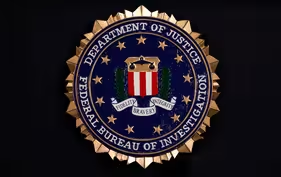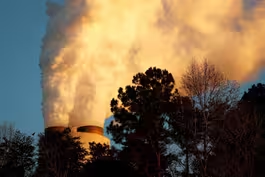
The potential dangers of AI tool creating realistic video
Clip: 2/21/2024 | 6m 3sVideo has Closed Captions
The potentially dangerous implications of an AI tool creating extremely realistic video
The realism of AI-generated video is one of the more remarkable, and potentially scary, developments we’ve seen so far with the technology. Oren Etzioni studies artificial intelligence and is the founder of truemedia.org, an organization that fights against AI-based disinformation. Etzioni joined William Brangham to discuss the future of AI.
Problems playing video? | Closed Captioning Feedback
Problems playing video? | Closed Captioning Feedback
Major corporate funding for the PBS News Hour is provided by BDO, BNSF, Consumer Cellular, American Cruise Lines, and Raymond James. Funding for the PBS NewsHour Weekend is provided by...

The potential dangers of AI tool creating realistic video
Clip: 2/21/2024 | 6m 3sVideo has Closed Captions
The realism of AI-generated video is one of the more remarkable, and potentially scary, developments we’ve seen so far with the technology. Oren Etzioni studies artificial intelligence and is the founder of truemedia.org, an organization that fights against AI-based disinformation. Etzioni joined William Brangham to discuss the future of AI.
Problems playing video? | Closed Captioning Feedback
How to Watch PBS News Hour
PBS News Hour is available to stream on pbs.org and the free PBS App, available on iPhone, Apple TV, Android TV, Android smartphones, Amazon Fire TV, Amazon Fire Tablet, Roku, Samsung Smart TV, and Vizio.
Providing Support for PBS.org
Learn Moreabout PBS online sponsorshipWILLIAM BRANGHAM: I want to show you some video.
Look at that adorable puppy trying to navigate those window sills in Italy, or this woman strolling at night through downtown Tokyo, or this, a street parade celebrating the Chinese lunar new year.
None of these is real.
They're 100 percent generated by an artificial intelligence program created by OpenAI called Sora.
And they were created with a very simple text prompt, just a sentence or two saying, make a video of a stylish woman dressed in black walking down a street in Tokyo.
And these are the results.
The implications of this technology, of being able to create extremely realistic-looking video with nothing more than a few words of suggestion, is one of the more remarkable and potentially scary developments we have seen so far in artificial intelligence.
Oren Etzioni studies A.I.
and its implications.
He's the founder of TrueMedia.Org, an organization that fights against A.I.-based disinformation.
Oren Etzioni, thank you so much for being here.
Before we get to the implications of this, I wonder, when you first saw those videos and knew how they were created, what was your reaction?
OREN ETZIONI, Founder, TrueMedia.Org: I was absolutely terrified.
It's the future and it's come very fast and a lot sooner than any of us expected.
WILLIAM BRANGHAM: So, terrified.
I have to say, I was at first struck by just -- I couldn't believe that they were able to make such extraordinarily realistic videos with such simple prompts like that.
Why does it terrify you?
OREN ETZIONI: What terrifies me is deepfakes, is the use of this technology, which, of course, has many positive uses, but the use of it to create forgeries, and particularly coming up on one of the most consequential elections in history.
WILLIAM BRANGHAM: So walk me through some of those.
Like, sketch out some of the kinds of things that you worry this technology could be used for.
OREN ETZIONI: We have already had robocalls in New Hampshire that were supposed to be by President Biden, but they weren't.
That's nothing compared to seeing videos on social media of different candidates doing things that didn't happen.
WILLIAM BRANGHAM: I mean, yes, you could certainly see a late-breaking circumstance right before an election, as you're saying, where some nefarious actor posts a video.
I mean, there is just something that is so convincing about this kind of video.
OREN ETZIONI: We're visual animals.
You see a political candidate being rushed to the hospital.
You see talking heads getting on television, his doctor saying, it doesn't look good.
But it's all fake.
And you can see a lot of it coming at once.
We used to have state actors doing this, but now practically anybody can do it.
WILLIAM BRANGHAM: I mean, the -- what is the solution for this?
I mean, some of the bigger companies say that they will put these so-called watermarks, sort of transparent image that will be imprinted on the video to signal that it is generated by A.I.
But not everyone's going to do that, certainly not the bad actors.
What is the - - what do -- how do we get around this?
OREN ETZIONI: There's no silver bullet.
The problem with watermarks is, what if they're using a model that doesn't have watermarks, doesn't have these identifying characteristics?
We are trying to build detection technology at TrueMedia.Org, so if you upload a video or social media post, we can assess whether it's true or fake.
But that can be circumvented as well.
We need better regulations.
We need better education.
And we need everybody to chip in.
WILLIAM BRANGHAM: I mean, there are times where you can see the fakery.
I mean, A.I.
seems to have a hard time depicting human hands for some reason.
And even OpenAI on Sora posted some examples that are clearly where the software is off.
But isn't it just going to be this constant escalating arms race of new creations and then the trying to play catchup with detecting that fakery?
OREN ETZIONI: This is moving so fast, it's going to get worse before it gets better.
And with low-resolution video that looks like it's shot by a phone, you often will not be able to tell whether this is fake or real.
WILLIAM BRANGHAM: I mean, right now, right, I'm talking to you via Skype, but you're sitting in Mexico.
It's hard to know that that's really you sitting there.
OREN ETZIONI: Well, we had an instance of a scam where somebody gave away $25 million because he thought he was talking to his colleagues on a video call.
It's absolutely a case of be careful what your eyes are telling you.
(LAUGHTER) WILLIAM BRANGHAM: Congress and the White House have been debating what rules or regulations that they could do to try to help solve this issue.
Do you think that there is a tool or law that could come out of Washington that might address this?
OREN ETZIONI: We are seeing laws and regulations coming out of the states already passed in several states, including California, Washington, Minnesota, et cetera, prohibiting deepfakes 30 days, 90 days before the election.
So I do think that there are things we can put in place.
I don't know if they will come out of Washington, but they will be in place.
It won't solve the problem because foreign adversaries can do this sort of thing as well.
We need to step up and do whatever we can.
WILLIAM BRANGHAM: So you think the genie is sort of out of the bottle here?
OREN ETZIONI: Genie is out of the bottle.
It's just a question of how much damage it'll do in what's a very close election.
WILLIAM BRANGHAM: All right, Oren Etzioni of TrueMedia.org, if that really is you sitting there, it's a pleasure to talk to you.
Thank you so much.
OREN ETZIONI: The pleasure is mine.
App connects drivers to lawyers during traffic stops
Video has Closed Captions
Clip: 2/21/2024 | 8m 9s | App connects drivers with lawyers to de-escalate police interactions during traffic stops (8m 9s)
Ex-informant accused of lying and having ties to Russia
Video has Closed Captions
Clip: 2/21/2024 | 8m 22s | Informant in GOP's Biden investigation accused of lying and having ties to Russia (8m 22s)
Experts discuss future of UNRWA and allegations against it
Video has Closed Captions
Clip: 2/21/2024 | 9m 16s | Experts discuss future of UNRWA in Gaza and allegations some employees helped Hamas (9m 16s)
How an Alabama ruling that embryos are children impacts IVF
Video has Closed Captions
Clip: 2/21/2024 | 7m 20s | How an Alabama Supreme Court ruling that frozen embryos are children impacts IVF (7m 20s)
States challenge rule aimed at reducing drifting pollution
Video has Closed Captions
Clip: 2/21/2024 | 7m 10s | Supreme Court hears challenge to rule reducing pollution drifting between states (7m 10s)
Providing Support for PBS.org
Learn Moreabout PBS online sponsorship
- News and Public Affairs

FRONTLINE is investigative journalism that questions, explains and changes our world.

- News and Public Affairs

Amanpour and Company features conversations with leaders and decision makers.












Support for PBS provided by:
Major corporate funding for the PBS News Hour is provided by BDO, BNSF, Consumer Cellular, American Cruise Lines, and Raymond James. Funding for the PBS NewsHour Weekend is provided by...




